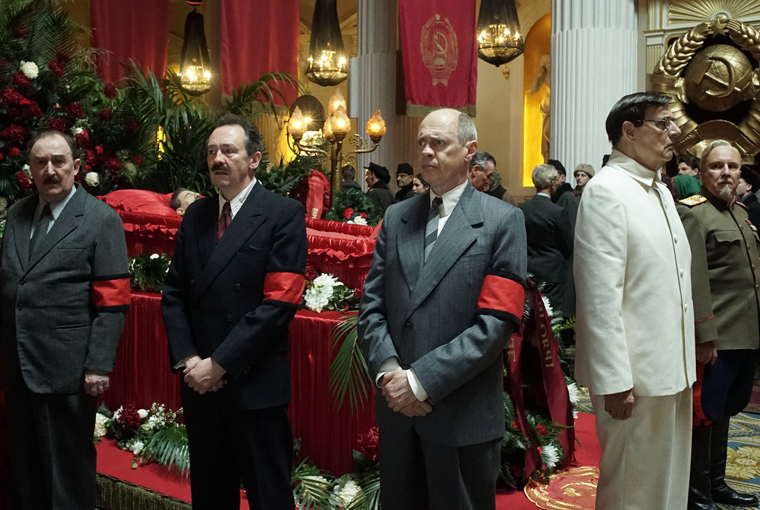Don’t Die, Daddy
Armando Iannucci’s The Death of Stalin (2017)
Vol. 82 (February 2018) by Daniil Lebedev
Stalin. But, please, don’t rush with it, and know that we won’t accept a hasty work. Repin worked for 11 years on his “Cossacks”.
Molotov. 13 years.
Stalin (insistently). 11 years.
Transcript of the conversation between J. Stalin and S. Eisenstein during the making of the film “Ivan the Terrible” (February 26, 1947).
The year is 1957. In Italy, Boris Pasternak published his novel Doctor Zhivago, for which he was to be awarded a Nobel prize in 1958, the same year the slander campaign against him was initiated in the USSR. His novel was accused of being anti-patriotic, anti-Soviet and horrible in all respects, though none of the critics had actually read it, for the simple reason that the novel was inaccessible on USSR territory. The campaign would go down in history with the catchphrase “I haven’t read it, but I accuse!”
18th of February 1964. Joseph Brodsky (yet another poet and Nobel laureate) was on trial for social parasitism (in short, for doing nothing good for society). None of the witnesses for the prosecution had actually known Brodsky personally. The refrain of this trial was “I never met Brodsky, but…”
April 2016. The trailer for Alexei Uchitel’s new film was released, which narrates the love affair between Zar Nicholas II and ballerina Mathilda Kschessinska. Unfortunately for the film, Nicholas II had been canonized as a martyr by the Russian Orthodox Church, so there was a problem. The squall of complaints was addressed to the Procuracy – first from the movement “Tzar’s cross”, then from deputy Natalia Poklonskaya. An online petition against the movie gathered 25 000 signatures. The Russian Orthodox Church published a statement claiming that the film was an insult. Hundreds of people gathered in Moscow for a “prayer meeting” against the film. And all that happened before anyone could actually see Matilda.
On the morning of the 23rd of January 2018, two days before the planned Russian premiere of Armando Ianucci’s The Death of Stalin, history again repeated itself. First a group of “Duma lawyers” wrote a letter to the Ministry of Culture claiming to have found in it “signs of extremism”. The exact wording is as follows:
The film “The Death of Stalin” aims to stir up hatred, to disparage Russian (Soviet) people, to propagandize an inferiority of a person by his or her social or national identity, which are characteristics of extremism.1
Then accusations started to come from Duma deputies. Elena Drapeko made a fiery speech calling the film “a lampoon, a provocation, an attempt to convince us that our country is horrible, that our people are idiots and our rulers are fools”2. A letter from the cultural functionaries headed by none other than Nikita Mikhalkov followed:
That is a libel against the history of our country. This malignant and absolutely inappropriate so-called “comedy” is soiling the memory of our citizens, who overcame fascism. […] The fact that the movie is going to come out on the eve of the Stalingrad battle anniversary is a spit in the face of all those who died there as well as those who are still alive.3
The full stop was put by the Minister of Culture in person, who said:
We don’t have censorship. We are not afraid of a critical and impartial investigation of our history. What is more, rigorous and exact self-evaluation is a tradition in our culture. But there is a moral border between critical analysis of history and mockery.4
As a result, the screening permission for the film was withdrawn.
If we were to look for a common denominator of these four cases – Pasternak, Brodsky, Uchitel, Ianucci – it would not be the nature or source of the attack: Uchitel was attacked by simple orthodox babushkas; Ianucci by Nikita Mikhalkov; Brodsky by a pipelayer; Pasternak by his fellow writers. What all four cases nevertheless share is that the very circumstances surrounding the making of these judgements made it impossible to verify their fairness.
It is plain and clear that you can’t tell if a man is a social parasite or not if you don’t know him, or that you can’t judge a novel you have not read, or that you cannot protest against a movie that you have not seen. Or – in Ianucci’s case – you cannot ban a film by arguing that it will insult people’s feeling. The paradox of the situation crystallizes in the judgement itself. In his official statement the Minister of Culture claimed that what is “most disgusting – the film could be seen as a mockery of the victims of Stalinism”. Well, how is that possible? How can the film be a mockery of Stalinism and of its victims at the same time?
We saw the same paradoxical situation in the case of Matilda: the protesters insisted on defending the historical truth by refusing, on religious grounds, to accept an established historical fact – that Nicholas II had actually had an affair with the ballerina. Their argument was not that the facts are presented in an inappropriate way in the film, but that they are lies.
So what is the Ianucci film all about?
Well, if I had to outline the plot, I could not do any better than Elena Drapeko did in her fiery speech in front of The State Duma: “Stalin lies in a pool of piss, and all around him – monsters fighting for power”. That’s really it. (I should probably mention here that Stalin lying in a pool of piss is also an established historical fact, so nothing to pull a face about, Miss Drapeko).
What comes to one’s mind in the first minutes of the film is the surprising fact that the political situation of these years had not been at the center of a big comedy prior to Ianucci’s feat. The period of Great Terror is indeed a perfect object to be ridiculed. It has everything: political logic run wild, exaggeration at every step, absurd accusations, absurd trials, absurd violence and, of course, ridiculous language of worn-out clichés and rites of propaganda accompany it all. Whereas the comic richness of Soviet totalitarian discourse has been widely explored in Russian underground literature since the 1960s (D. Prigov, S. Sokolov, V. Sorokin) and art (V. Komar and A. Melamid, A. Kosolapov, artists of the Sots art movement), cinema was slow to start (partly because, being an expensive art, it used to be difficult for cinema to be “underground”).
How can you not laugh at a country where you could be arrested for telling an anecdote, where the whole system of judgment lost its head to the point of inventing its own twisted logic to explain its atrocities, where the belief in the Party reached such a hallucinatory degree that even political prisoners of the regime continued until their deaths to see their arrests as “mistakes”, where mass fear almost took a form of euphoria. “It’s incredible. And to believe that no one obliges them,” Stalin’s daughter exclaims in the film while looking at never ending processions of mourning people approaching her father’s grave.
To explain Ianucci’s perspective and give you an example of an aspect of Soviet politics that is as real as it is grotesque, I would like to cite a passage from the memoirs of Khrushchev, where he describes his reaction to the trial against Genrikh Yagoda:
When Yagoda was accused of taking steps to aggravate Gorky’s illness, the reasoning was this: Gorky loved to sit near the fire, and he and Yagoda often visited each other, being good friends. And so Yagoda made huge fires for the purpose of letting Gorky catch a cold and shorten his life. That seemed a little strange to me. I myself also love fires and I don’t know anyone who doesn’t. A normal man is able to regulate his own fire. After all, you can’t tie up Gorky to a fire and roast him.5
Well, if that is normal reasoning for Khrushchev himself, then there is really nothing extraordinary about the Ianucci comedy, which turns around the same kind of ridiculous arguments between the members of Politbureau.
But because we’re talking about a comedy, first of all I would like to say that the film is hilarious – and more so for anyone even vaguely familiar with the history of this period (1930s-1950s). And a comedy, as everyone knows, doesn’t have to have a plot more developed than the one mentioned above. Secondly, it is in no way a prerogative of the comedy genre to depict the “true personalities” of historical persons ridiculed, because its first goal is not to give a lesson of history, but to make viewers laugh. And to make people laugh you have to pick up something from a historical personality to make it recognizable, and then inflate this something to the size of a person. What the adversaries of The Death of Stalin suggest is that the movie is not historically authentic, but you really have to be insane to believe that it is.
It is funny when in the film Stalin’s immediate successor Malenkov, having asked about the well-being of one of the old bolsheviks killed by the regime, says, dejected: “I’m tired. I don’t remember who’s alive and who’s not”. It is funny when, seeing Stalin dead, he says “We should call a doctor”, and Beria answers: “Unfortunately, we arrested all good doctors for treason against the Motherland”, thus evoking the famous doctor’s plot. It is funny when Molotov, seeing Orthodox priests arriving at Stalin’s funeral, says: “Jesus Christ, bishops! I thought we were done with these freaks”.
If they could see what’s funny about the film, Drapeko or Minister of Culture Medinsky wouldn’t make their funny comments about it. I would even chance the conjecture that the fact that they don’t see what’s funny only confirms the idea that the nature of power in Russia hasn’t yet changed considerably and that for them to laugh at Ianucci’s film would be to laugh at themselves.
They also say the film is not funny because you can’t laugh about some things. This conception has already been condemned by Hannah Arendt, who suffered for her laughing, and I only have to cite her words:
Some people take it amiss… That to some extent I can still laugh, for example. But I really thought Eichmann was a fool. I read a transcript of his police hearing. 3600 pages in all, I read it very carefully. I laughed countless times. I laughed out loud. People were offended by this. I can’t do anything about that. But I know one thing. I’ll probably still laugh 3 minutes before certain death. That, they say, is the tone of my book. And it is true that the tone is predominantly ironic. The tone is really the person. But when people reproach me with accusing the Jewish people, this is a malignant lie and propaganda.6
Without elevating Ianucci’s comedy to the level of Arendt’s book, we should admit that protests against his film are also protests against tone. And to figure out the tone of this film it is enough to look once again at the ingenuous formula of Elena Drapeko: “Stalin lies in a pool of piss, and all around him – monsters fighting for power”. What Russian protestors could not accept is not that Stalin is depicted as an impetuous dictator (which we saw countless times in cinema), but that he is lying in his own piss. The big insult is laughter. It is unacceptable to talk about sensible themes with an “inappropriate” pathos.
Russian critic Anton Dolin remarks that in the film Stalin is literally “killed by laughter”7. The moment before his death he receives a note from pianist Maria Yudina. In this note she calls him a tyrant and wishes him death. Stalin laughs at the note – and dies. Needless to say Stalin is surely still more alive than ever in Russia. According to the latest poll, 38% of Russians included Stalin in the list of the most remarkable personalities in world history (president Putin and poet Pushkin lag behind with 34% each). The danger that lies in laughter for the symbolic life of Stalin has been well sensed by the Russian Ministry of Culture.




Leave a Comment